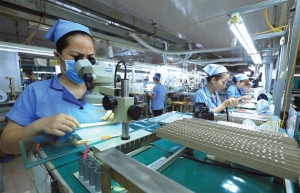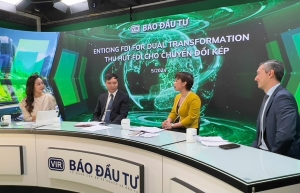Brighter talent means a fresh perspective
Vietnam requires a vast number of talented individuals qualified to push the country towards green and digital targets. How is the country doing in these terms?
RMIT has been here in Vietnam for more than 20 years, and keeps on investing in Vietnam. And one of the things that we are committed to is to make sure that our students are ready, not for 2024, but really much more strategically. That means giving them the support that they need for their digital skills or sustainable mindset to make sure that they can contribute to Vietnam in the best possible way, in the green economy.
 |
| Santiago Velasquez, associate programme manager for the Master of Business Administration programme at RMIT University Vietnam |
So yes, there is big potential. But there is a gap with the readiness of the workforce. The digital economy contributes over 12 per cent to the GDP of the country. The green economy generated $6.7 billion in 2020, and foreign direct investment deposits in green sectors were $9 billion from 2017 to 2021. There’s a problem in the workforce in which we have millions of people in the green economy, but only 62 per cent have basic skills related to digitalisation and only around 0.4 per cent have advanced skills.
These advanced skills in digitalisation are what support people to be able to contribute to machine learning, data centres, cybersecurity, AI, and all these aspects that are important. So we should train our people to make sure that they’re ready. We are really striving for this and RMIT is at the forefront, making sure that our programmes provide those skills to our students.
What is RMIT’s stance on Vietnam’s digital direction and why is this direction a good thing?
The way that we assess our students really focuses on giving them those skills that they need to move forward. There have been directives like the national digital transformation strategy that focuses on providing digital literacy across all sectors. Vietnam has the e-governance strategy, which focuses on enhancing public policy, and the digital economy and digital society directive, which covers strategy and programmes that focus on providing businesses and citizens with digital skills.
The e-government, e-economy, and e-society are three factors that go together. An e-government can provide the policies to direct the businesses and the society. An e-economy can provide the businesses with the required tools for them to be competitive. And an e-society will respond and communicate with the government to provide support to the needs of the companies.
So, there has to be some form of bringing foreign mindsets into Vietnam with new perspectives, new ways to see the world, and innovative capacity. At the same time, there is a local workforce that is hungry to improve and compete, and they will get infused by the mindsets from outside. They need to be trained by universities, and we have to reach a critical mass to provide what is necessary for Vietnam to compete.
From your international research, how can experience from other countries be applied to Vietnam’s green and digital development?
Even just around our neighbourhood here in Vietnam, we can find many options. Singapore has this e-government master plan that has a very catchy phrase, shifting from a “government to you” towards a “government with you.” They have been able to bring together citizens and businesses to create mobile services and applications that help catapult digital transformation.
They have created, for example, platforms that allow people to buy or sell their real estate easily. They have created platforms to make crowdsourcing and allow surveys across the nation to get feedback from the citizens if things are working or not.
In Australia, they have been pushing this national energy productivity plan, aiming to increase energy productivity by 40 per cent. They have many kinds of strategies that can also be adopted, such as in optimising energy use in houses, apartments, commercial centres, and malls.
Closer to here, we have Indonesia, which has made strides in terms of digital transformation in many aspects. They have the Golden Indonesia 2045 strategy, which has components related to technology and digitalisation. And we know that it’s working because a few weeks ago, Microsoft announced that they would put $1.7 billion in Indonesia to create capacity for data centres and for AI. And this comes together with 840,000 jobs that will be upskilled across the country.
Vietnam is in a good position because ASEAN is taking initiatives, for example, in their Digital Economy Framework Agreement. This focuses on tripling the digital economy to $1 trillion, and then perhaps unlocking more. What they want to do is to make sure members adopt AI and take care of cybersecurity.
And these are all examples of things that can be benchmarked. You could, for example, benchmark specific business practices. Everything has been digitalised, from the banking sector to forestry. They have created digital twins of production lines and forest plantations, and if they’re able to digitalise a forest, they can digitalise anything.
 | Groundwork laid for the dual transition Vietnam’s strategic focus on attracting high-quality foreign investment is being demonstrated through its emphasis on green and digital transformation projects, supported by robust legal frameworks and a strong commitment to sustainability and technological innovation. |
 | VIR talkshow on the green-digital dual transition At the VIR talkshow “Enticing FDI for Dual Transformation,” speakers discussed the factors needed to create a stable and effective FDI environment. |
What the stars mean:
★ Poor ★ ★ Promising ★★★ Good ★★★★ Very good ★★★★★ Exceptional
Related Contents
Latest News
More News
- Hermes joins Long Thanh cargo terminal development (February 04, 2026 | 15:59)
- SCG enhances production and distribution in Vietnam (February 04, 2026 | 08:00)
- UNIVACCO strengthens Asia expansion with Vietnam facility (February 03, 2026 | 08:00)
- Cai Mep Ha Port project wins approval with $1.95bn investment (February 02, 2026 | 16:17)
- Repositioning Vietnam in Asia’s manufacturing race (February 02, 2026 | 16:00)
- Manufacturing growth remains solid in early 2026 (February 02, 2026 | 15:28)
- Navigating venture capital trends across the continent (February 02, 2026 | 14:00)
- Motivations to achieve high growth (February 02, 2026 | 11:00)
- Capacity and regulations among British areas of expertise in IFCs (February 02, 2026 | 09:09)
- Transition underway in German investment across Vietnam (February 02, 2026 | 08:00)

 Tag:
Tag:


















 Mobile Version
Mobile Version